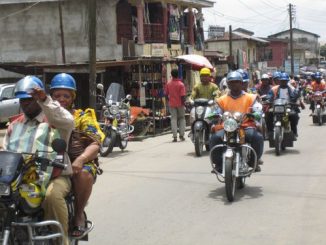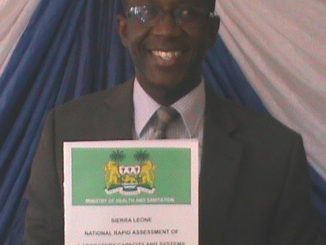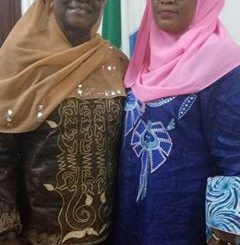
*SIERRA LEONE AT 64: INDEPENDENCE WITHOUT PROSPERITY — A NATION StTILL CHAINED BY POVERTY AND POOR LEADERSHIP*
By Mahmud Tim Kargbo
Saturday, 27 April 2025
*A Bitter Anniversary: 64 Years of Political Freedom, Economic Captivity*
Sixty-four years after gaining independence from British colonial rule on 27 April 1961, Sierra Leone stands at a critical crossroads. While Independence Day is traditionally marked by celebration, for many it evokes a more sombre reflection — a stark reminder that political sovereignty was achieved, but true independence — economic, intellectual, and moral — remains painfully out of reach.
*Founders’ Vision Versus Today’s Reality*
At independence, Sierra Leone’s founding fathers envisioned not merely the transfer of political power, but the emancipation of the people from poverty, ignorance, and fear.
The 1991 Constitution of Sierra Leone enshrines this aspiration. Its preamble reaffirms a commitment to “maintaining the unity and freedom of the people of Sierra Leone”, while Section 5(2)(b) declares that “the security, peace and welfare of the people… shall be the primary purpose and responsibility of Government”.
Yet, six decades on, these constitutional promises remain largely unfulfilled. The majority of Sierra Leoneans live below the poverty line, grappling with insecurity, illiteracy, unemployment, and collapsing essential services. Justice is often selective, and democracy reduced to a mechanical exercise in voting, rather than meaningful citizen engagement.
James Madison once cautioned:
“The essence of government is power; and power, lodged as it must be in human hands, will ever be liable to abuse.”
Successive regimes — notably the All People’s Congress (APC) and Sierra Leone People’s Party (SLPP) — have often wielded state power not in service of the people, but for personal enrichment.
*Leadership Crisis: Betrayal of the Public Trust*
Since the stabilising efforts of the late President Ahmad Tejan Kabbah post-civil war, Sierra Leone’s leadership has largely regressed into transactional politics.
True statesmanship — exemplified by Nelson Mandela’s maxim that,
“A leader is like a shepherd. He stays behind the flock, letting the most nimble go ahead, whereupon the others follow.”
— has been abandoned. Instead, neo-colonial economic structures persist, regional and tribal divisions deepen, and public office is frequently seen as a gateway to personal fortune rather than a sacred trust.
Despite the constitutional guarantee under Section 8(1)(a) — the right of every citizen to pursue any economic livelihood — economic opportunities remain confined to a narrow elite.
*Poverty: A Systematic Tool of Oppression*
As Kwame Nkrumah warned,
“Neo-colonialism, the last stage of imperialism,”
thrives where foreign interests and local elites collaborate against the national good.
Today, foreign multinationals continue to exploit Sierra Leone’s mineral wealth, while the political class diverts public resources. Over 56% of citizens live in multidimensional poverty (World Bank, 2024).
Section 7(1)(a) of the Constitution mandates the State to “harness all the natural resources of the nation to promote national prosperity and an efficient, dynamic and self-reliant economy”. Yet, dependency on foreign loans — often negotiated in secret, with conditions inimical to national development — persists, violating principles of transparency under international frameworks like the UN Convention Against Corruption (UNCAC, Articles 5 and 9).
*The Illusion of Unity*
Though national unity remains a constitutional ideal (Section 5(2)(c)), Sierra Leone continues to fracture along political, ethnic, and regional lines.
In the words of Alexis de Tocqueville,
“The health of a democratic society may be measured by the quality of functions performed by private citizens.”
However, civil society in Sierra Leone is often marginalised, co-opted, or intimidated — eroding democratic accountability.
Elections are marred by violence and manipulation, rather than genuine competition of ideas. Tribalism, not merit, too often determines opportunity.
*A Betrayed Generation: Youth Left Behind*
Perhaps the most damning indictment of post-independence Sierra Leone is the fate of its youth.
Despite Section 9 of the Constitution requiring the State to guarantee “adequate educational opportunities for all citizens”, thousands of young people face broken schools, mass unemployment, and a hopeless future.
Substance abuse, especially the spread of the synthetic drug “Kush”, symbolises a generation abandoned. Youth unemployment, at over 60% (African Development Bank, 2024), feeds despair, crime, and political violence.
Kofi Annan rightly observed:
“Young people must be at the forefront of global change and innovation.”
Yet Sierra Leonean leaders have failed to harness this potential, instead exploiting the youth as foot soldiers for political battles.
*Chains of the Mind: Apathy and Dependency*
True independence is more than political sovereignty; it demands moral, intellectual, and economic freedom.
As Mahatma Gandhi taught,
“The discipline of action”
is essential. Passive dependency on corrupt politicians or foreign donors merely perpetuates subjugation.
Section 8(1)(b) of the Constitution instructs that “the State shall promote the political, economic, social and educational development of the people”. This development cannot occur without an awakened, critically engaged citizenry.
*Towards Genuine Independence: Urgent Reforms*
Sierra Leone must act decisively to realise the full promise of independence:
Constitutional and Governance Reforms
Fully empower independent anti-corruption bodies (UNCAC Article 6).
Strengthen judicial autonomy; limit executive overreach.
Enforce mandatory asset declarations for all public officials.
Economic Diversification
Develop agriculture, technology, tourism, and light manufacturing.
Prioritise local content and protect emerging industries under the African Continental Free Trade Area (AfCFTA).
Youth Development and Civic Education
Launch national entrepreneurship hubs and vocational training centres.
Integrate constitutional and citizenship education into school curricula.
Promote national service programmes fostering unity and responsibility.
War on Substance Abuse
Establish nationwide rehabilitation centres.
Fund community-based initiatives offering mental health support and youth mentorship.
Transparent International Partnerships
Ensure all foreign agreements align with human rights principles, particularly those set forth in the African Charter on Human and Peoples’ Rights (1981).
*A Call for Collective Responsibility*
The unfinished work of independence rests with every Sierra Leonean.
John Stuart Mill captured it perfectly:
“A people who mean to be their own governors must arm themselves with the power which knowledge gives.”
To honour the sacrifices of 1961, we must now build a Sierra Leone where every citizen can live with dignity, hope, and opportunity — not merely survive, but truly thrive.
The time to fulfil our independence is now.
BAKARR’S COMMENT
Good morning to all sierra Leoneans and happy independence day in backwardness and poverty, poor electricity, poor health care system, no good water system, too much injustice, a nation whose 80 % salary is paid by donor funds, a country where sababu is the oder of the day to get job, a country where politics has been a weapon for the opposition, a country whose parliament is useless as it members they represent not the will of the people, a country whose leaders are ready to sell the nation for a penny, a country whose minerals cannot benefit it own people, a land where foreigner has more power than it citizens etc etc that land is call sierra Leone, sierra Leone bleed and Will continue to cry until the end of time, we are not a honest nation, too much of hypocritical thought. What is there to celebrate.
We will continue in this deplorable condition for as long as we continue supporting wrong things, wrong leaders, our can a country vote for someone who has been unemployed for 21 years, who cannot show his asset, who live on social handout in England for 21 years, Bo we get what we deserve, that tell you who we are, we don’t care about policies, most of us are followers, no love for the country you call home, as long as you pot curba.




Leave a Reply